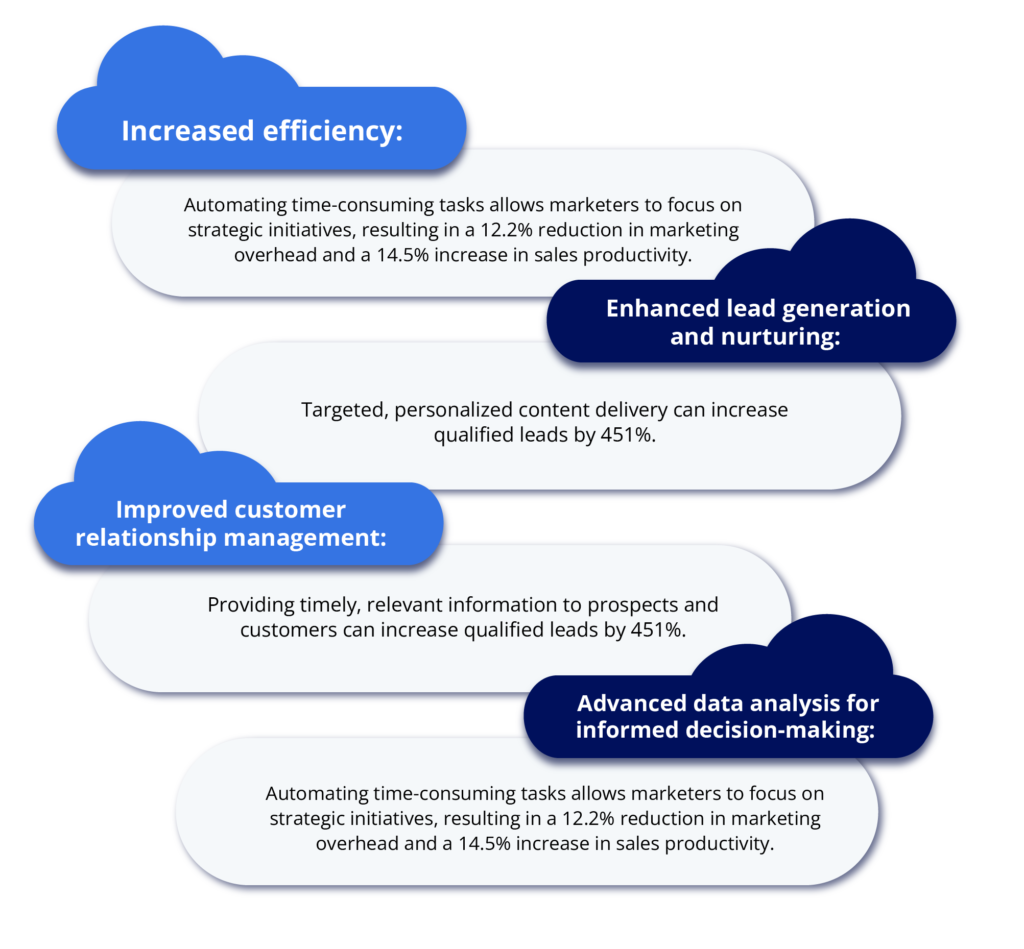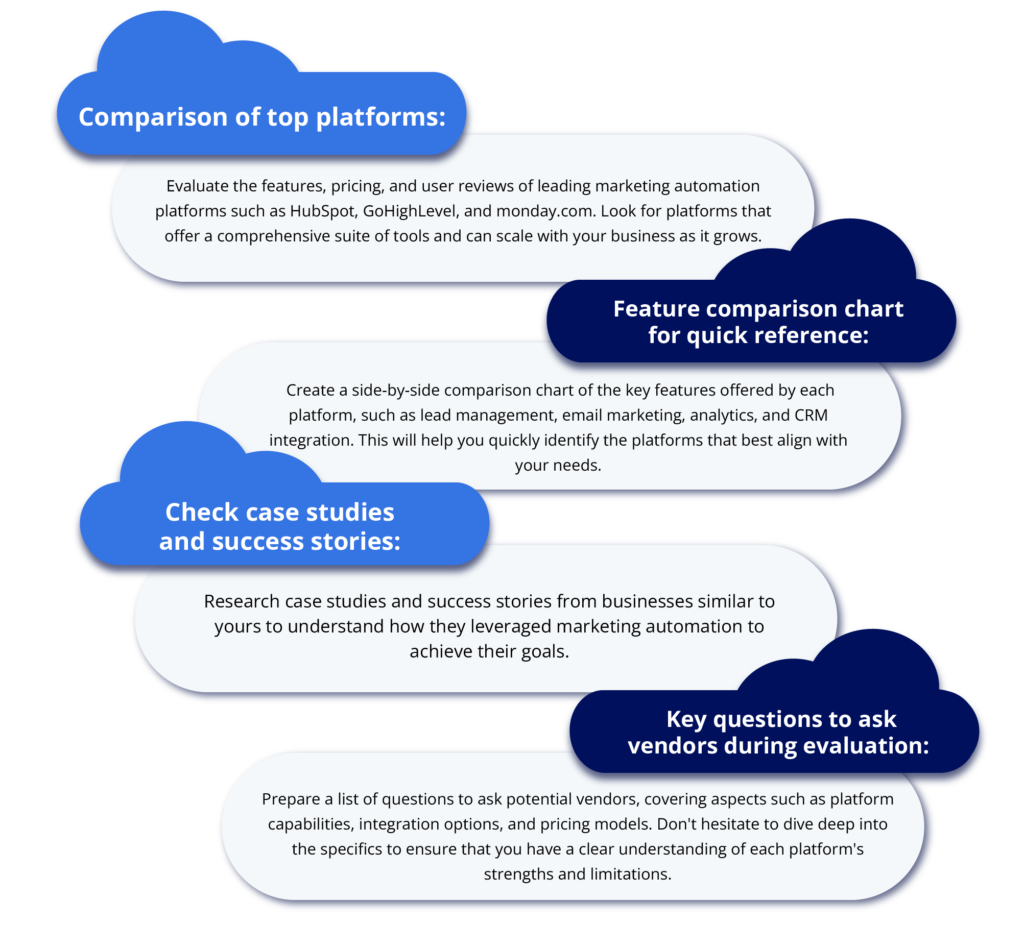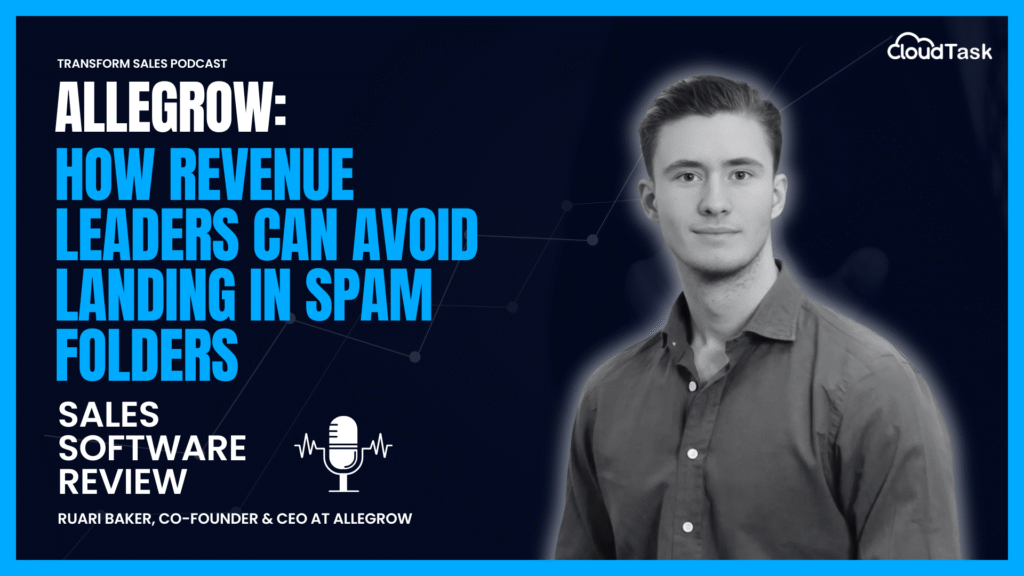B2B marketing automation has become a crucial tool for businesses looking to streamline their processes and drive growth.
However, many companies struggle to effectively implement B2B marketing automation strategies, leading to missed opportunities and suboptimal results.
Automation’s complexity can be overwhelming, making it difficult to identify the right platform and approach for your organization.
In this blog post, we’ll guide you through the key considerations for building a solid B2B marketing automation strategy, helping you navigate the challenges and unlock the full potential of automation for your business.
What is B2B Marketing Automation, and What Are The Benefits?
B2B marketing automation involves using software and technology to automate repetitive marketing tasks, such as email campaigns, social media posting, and lead management.
We can efficiently foster leads, tailor their messaging, and ultimately increase conversions by simplifying these procedures.
The core components of B2B marketing automation include lead generation and management, email marketing, social media management, and analytics and reporting.
The benefits of implementing B2B marketing automation are significant:

Key Features to Look for in a Marketing Automation Platform
When evaluating marketing automation platforms, consider a range of features that will support your business objectives and enable you to execute your strategies effectively:
- Lead management and scoring: Automatically track, segment, and prioritize leads based on their behavior and engagement levels. According to HubSpot, companies that excel at lead nurturing generate 50% more sales-ready leads at a 33% lower cost.
- Comprehensive email marketing tools: Create, schedule, and send personalized email campaigns with ease. Platforms with built-in data enrichment tools, like Clay, can help you enhance your email marketing efforts by providing more accurate lead data, enabling better segmentation and personalization.
- Seamless CRM integration: Ensure a holistic view of your customer data. Businesses that use marketing automation with CRM have seen a 79% increase in sales revenue.
- Detailed analytics and reporting: Gain valuable insights into your marketing performance. Companies that use analytics are 2x more likely to outperform their peers.
- Multi-channel marketing support: Create a cohesive customer experience across email, social media, and SMS.
- Personalization and segmentation capabilities: Tailor your marketing messages to specific audience segments. Personalized emails deliver 6x higher transaction rates.
- Scalability and flexibility to grow with your business: Choose a platform that can adapt to your changing needs. Scalability is a top priority for most marketers when selecting a marketing automation platform.
Assessing Your Business Needs for Marketing Automation
Investing in a marketing automation platform is a significant decision that requires careful consideration of your business needs and objectives.
To ensure that you select a solution that aligns with your goals, it’s essential to conduct a thorough assessment of your current situation and future aspirations.
Consider the following factors:
- Identifying business goals and objectives: Clearly define what you want to achieve through marketing automation, such as increasing lead generation, improving customer engagement, or boosting sales. If one of your primary goals is to improve lead generation, consider tools like RB2B that can help identify website visitors and generate high-intent leads.
- Evaluating current marketing processes and tools: Take a close look at your existing marketing stack and identify areas where automation can help streamline processes and fill gaps. This evaluation will help you determine which features and capabilities are essential in a marketing automation platform.
- Understanding your target audience and their journey: Gain a deep understanding of your ideal customer profiles and map out their buying journey. This insight will guide you in selecting a platform that can effectively nurture leads and deliver personalized experiences at each stage of the customer journey.
- Budget considerations and ROI expectations: Determine your budget for marketing automation and set realistic expectations for the return on investment you aim to achieve. Keep in mind that while marketing automation can deliver significant results, it’s essential to choose a platform that fits within your financial constraints and offers a clear path to ROI.
How to Select the Best Marketing Automation Platform
The options for marketing automation are extensive, with many platforms offering various features and capabilities.
Selecting the best platform for your business can be daunting, but by following a structured approach, you can make an informed decision that aligns with your needs and goals.
When evaluating potential marketing automation platforms, consider the following factors:

Steps to Implement Your B2B Marketing Automation Strategy
Implementing a marketing automation strategy is a multi-step process that requires careful planning, execution, and ongoing optimization.
Once you have selected the right platform for your business, it’s essential to follow a structured approach to ensure a smooth implementation and maximize the effectiveness of your automation efforts.
Successful implementation of a marketing automation strategy requires collaboration among different departments.
Follow these steps to successfully implement your marketing automation strategy:
- Setting up the chosen platform: Configure your marketing automation platform according to your business requirements, including setting up user accounts, defining lead scoring criteria, and creating email templates. Ensure that the platform is set up to track the metrics that matter most to your business.
- Integrating with existing systems: Integrate your email marketing automation platform with your CRM, ERP, and other relevant systems to ensure smooth data flow. When integrating your marketing automation platform with existing systems, such as your CRM, consider using data enrichment tools like Clay to ensure that high-quality lead data is being synced across platforms.
- Creating effective workflows and automation rules: Design and implement workflows and automation rules that align with your customer journey and business objectives. These workflows should deliver your messages to the right audience at the right time, guiding prospects through the funnel and nurturing them into customers.
- Training your team for optimal use: Provide comprehensive training to your marketing team on how to use the platform effectively, create campaigns, and analyze performance data. Ensure that your team is well-versed in best practices and can leverage these platforms to drive results.
- Testing and refining your strategy for continuous improvement: To optimize your strategy, regularly monitor and analyze the performance of your marketing automation campaigns. You can leverage tools like RB2B to identify high-intent leads from your website traffic, allowing you to refine your targeting and messaging over time.
Final Thoughts
Building a solid B2B marketing automation strategy is essential for businesses looking to stay competitive and drive growth.
The right platform, aligned with your business needs and target audience, can unlock marketing automation’s full potential, streamlining processes and generating high-quality leads.
If you need expert guidance on B2B marketing automation, explore the CloudTask Marketplace, where you’ll find a curated selection of top-performing sales agencies specializing in B2B marketing.
These organizations can assist you in developing and implementing a customized marketing automation strategy to achieve results and position your business for success.
Start your search for the perfect agency partner on the CloudTask Marketplace today.
Frequently Asked Questions (FAQs)
What are the common challenges in implementing B2B marketing automation?
- Common challenges include selecting the right platform, integrating with existing systems, ensuring data accuracy and training staff to use the tools effectively.
How can I measure the success of my B2B email marketing efforts?
- Success can be measured by tracking key performance indicators (KPIs) such as lead conversion rates, email open and click-through rates, customer engagement levels, and return on investment (ROI).
What role does personalization play in B2B marketing automation?
- Personalization is crucial because it allows businesses to deliver personalized content and messages to specific audience segments, increasing engagement and conversion rates. Personalized campaigns are more effective in nurturing leads and guiding them through the sales funnel.








